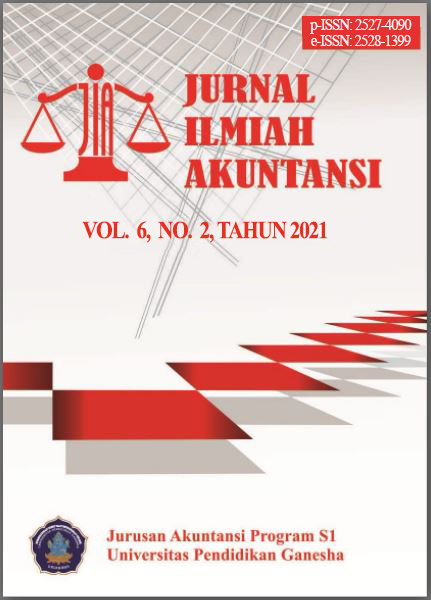The Role of Job Demands in Moderating the Relationship between Servant Leadership and Job Satisfaction: A Study on Civil Apparatus in Five Major Cities in Indonesia
DOI:
https://doi.org/10.23887/jia.v6i2.33412Keywords:
servant leadership, job demands, job satisfaction, moderation, civil apparatusAbstract
This research aims to reveal the effect of job demands in moderating the relationship between servant leadership and civil apparatus’ job satisfaction. This study involved 200 respondents who spread across Jakarta, Makassar, Medan, Semarang, and Surabaya, using convenience sampling technique. The data of this research were obtained through online surveys. The multiple linear regression analysis was used to test the moderating variable according to the statistical rules. To process the data analysis, we used IBM SPSS 23. The results showed that servant leadership had a positive effect on civil apparatus’ job satisfaction. However, job demands do not moderate the relationship between servant leadership and job satisfaction.
References
Bambale, A. J. (2014). Relationship between Servant Leadership and Organizational Citizenship Behaviors: Review of literature and future research directions. Journal of Marketing and Management, 5 (1), 1–16.
Bowling, N. A., Beehr, T. A., & Lepisto, L. R. (2006). Beyond job satisfaction: A five-year prospective analysis of the dispositional approach to work attitudes. Journal of Vocational Behavior, 69, 315–330.
Budiyanti, H., Patiro, S. P., & Nurman. (2018). Organizational justice perception of Indonesia civil servants, does it matter? Jurnal Ekonomi Dan Bisnis, 21 (2), 333–360.
Creswell, J. W. (2012). Educational Research: Planning, Conducting, and Evaluating Quantitative and Qualitative Research, 4th ed. Boston: Pearson Education.
Demerouti, E., & Bakker, A. . (2011). The Job Demands– Resources model: Challenges for future research. SA Journal of Industrial Psychology, 37(2), 1–9.
Djibran, S., & Patiro, S. P. S. (2019). Peran Kepemimpinan Transformasional Dalam Membentuk Kepercayaan Pegawai Badan Pengembangan Sumber Daya Manusia Daerah Provinsi Yang Berdampak Pada Motivasi Pelayanan. Jurnal Aparatur Kementerian Energi Dan Sumber Daya Mineral, 3(02), 63–73.
Eden, D., & Leviatan, U. (1975). Implicit leadership as a determinant of the factor structure underlying supervisor behavior scales. Journal of Applied Psychology, 60, 736–741.
Graen, G., & Cashman, J. F. (1975). A role making model of leadership in formal organizations: A developmental approach. In J. G. Hunt & L. L. Larson (Eds.), Leadership frontiers. Kent, OH: Kent State University Press.
Graham, J. W. (1991). Servant-leadership in organizations: Inspirational and moral. The Leadership Quarterly, 2, 105–119.
Greenleaf, R. K. (1977). Servant Leadership: A Journey into The Nature of Legitimate Power and Greatness. Mahwah, NJ: Paulist Press.
Hair, J. J. F., Black, W. C., Babin, B. J., & Anderson, R. E. (2014). Multivariate Data Analysis. 7th edition, Essex, England: Pearson Education Limited. England: Pearson Education Limited.
Hale, J. ., & Fields, D. . (2007). Exploring servant leadership across cultures: A study of followers in Ghana and the USA. Leadership, 3 (4), 397–417.
Hendrian and Patiro, S. P. S. (2020). The Effect of Leadership and Organizational Justice in Predicting Positive Emotion of Indonesian Civil Servants. 2nd International Seminar on Business, Economics, Social Science and Technology (ISBEST 2019), 19–27.
Ivancevich, J. M., Konopaske, R., & Matteson, M. T. (2008). Organizational Behavior and Management (8e ed.). Boston: McGraw-Hill Irwin.
Judge, T. A., Thoresen, C. J., Bono, J. E., & Patton, G. K. (2011). The Job Satisfaction-Job Performance Relationship: A Qualitative and Quantitative Review.
Karasek, R. A. (1979). Job demands, job decision latitude, and mental strain: Implications for job redesign. Administrative Science Quarterly, 24, 285-308., 24, 285–308.
Liden, R. C., Wayne, S. J., Zhao, H., & Henderson, D. (2008). Servant leadership: Development of a multidimensional measure and multi-level assessment. Leadership Quarterly, 19, 161–177.
Northouse, P. G. (2016). Leadership: Theory and Practice 7th edition, Thousand Oaks,. In California: SAGE Publications, Inc.
Panatika, S. A., O’Driscollb, M. P., & Anderson, M. H. (2011). Job demands and workrelated psychological responses among Malaysian technical workers: The moderating effects of self-efficacy. Work & Stress, 25(4), 355–370.
Parris, D. L., & Peachey, J. W. (2012). A systematic literature review of servant leadership: Theory in organizational contexts. Journal of Business Ethics, 113, 377–393.
Patiro, S. P. S., Wijanarko, & Batti, S. (2020). Transformational Leadership, Trust, and Motivation (Study of Government’s Human Resource Agencies in Indonesia). 2nd International Seminar on Business, Economics, Social Science and Technology (ISBEST 2019), 59–64.
Scarpello, V., and Vandenberg, R. (1987). The Satisfaction with my Supervisor Scale: Its utility for research and practical application. Journal of Management, 34, 451–460.
Schwarz, G., Newman, A., Cooper, B., & Eva, N. (2016). Servant leadership and follower job performance: The mediating effect of public service motivation. Public Administration, 94, 1025–1041.
Sendjaya, S. (2015). Personal and organizational excellence through servant leadership: Learning to serve, serving to lead, leading to transform. In Switzerland: Springer.
Spears, L. . (2010). Character and servant leadership: ten characteristics of effective, caring leaders. The Journal of Virtues and Leadership, 1(1), 25–30.
Suriastini, W., Sikoki, B., & Listiono. (2020). Gangguan Kesehatan Mental Meningkat Tajam di Masa Pandemi COVID-19? Survey METER: Survey-Measurement-Training-Research. Https://Surveymeter.Org/Id/Node/576.
Van Dierendonck, D., & Nuijten, I. (2011). The servant leadership survey: Development and validation of a multidimensional measure. Journal of Business and Psychology, 26, 249–267.
Yukl, G. (2010). Leadership in Organizations. (7th ed.). New Jersey: Prentice Hall.



1.png)


